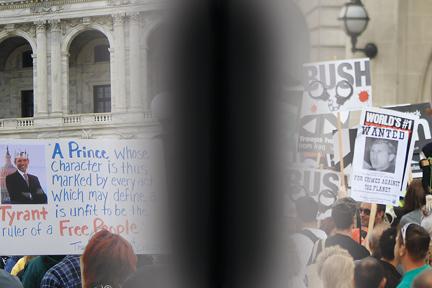Leehey: Control your own perception

Photo Illustration: Kelsey Kremer/Iowa State Daily
The American people have described President Obama’s venture into Libya and George W. Bush’s venture into Iraq as being the same. The differences between the two are many, and relevant in understanding how to assess the situations.
March 23, 2011
As a general rule, I do my best to avoid writing about national or global issues in my columns; I prefer to write about the kinds of things that we can affect as individuals.
Please then, keep in mind as you read this, that although I will be making reference to Libya and Iraq, my object is not policy but perception — I do not mean to discuss these events themselves, but rather how we as individuals choose to think about them.
By the time this is published, unless you take measures to actively avoid media, you will have been acquainted with the partisan spins given to the bombing in Libya.
I want to talk about two of them in particular here: the first is that liberals, having opposed and condemned George W. Bush’s war in Iraq, must now choose between applying the same condemnations to President Barack Obama or hypocrisy.
Catchy as this dichotomy may be, it rests upon an implicit premise: that the military actions taken in Libya by Obama and in Iraq by Bush are identical.
This is simply untrue; there are a great many differences between our contemporary involvement in Libya and our ongoing involvement in Iraq.
Operation Odyssey Dawn is the product of a U.N. Security Council resolution, and is being carried out in the name of humanitarianism by a coalition of formidable nations against a divided Libya.
Operation Iraqi Freedom was carried out primarily by the U.S. and Great Britain — in defiance of the U.N. — and was predicated upon faulty if not contrived intelligence of weapons of mass destruction, and directed against a sovereign nation that was firmly under the control of its regime.
Taking these facts into consideration, the dichotomy crumbles.
Partisans on the left are guilty of an equally distorted comparison: the notion that our intervention in Libya, due to its humanitarian goal, is morally superior to the American military involvement in Iraq under George W. Bush. But this argument neglects the humanitarian interests in deposing Saddam Hussein, whom we all know to have been a sadistic malignance inflicted upon the Iraqi people.
Both of these warped comparisons are designed, as all modern partisan propaganda seems to be, to reductively twist the truth like a dagger into the opposing tribe’s spine. Which is to say, there is nothing constructive whatsoever in these narratives; they are created to distract, misdirect and embarrass.
Nevertheless, many of us have dedicated ourselves against either Obama or Bush, and the opportunity to deride whichever of the two we happen to despise is tantalizing.
But to do so is to surrender our individual powers of critical thinking in exchange for an argument aimed not at truth, but at damaging the prestige of a political interest. Pursing such rhetoric places ideology before reality, party before nation.
Now, it may be beyond our abilities as individuals to sift our way to pure truth through the boggy waters of the heavily biased media machines set against us, but it remains fully within our sphere of control to apply reasoned analysis to parse the punditry.
It can be said that a good Democrat or a good Republican will propound the message of the party, but a real American will employ his or her God-given reason before deferring to that of a prejudiced multitude.
















